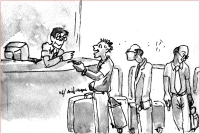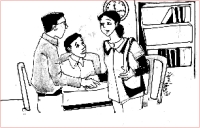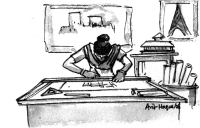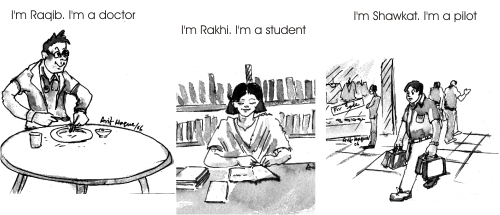| Reader's Club
Where Are You From?
when two people are introduced to each other, it's quite natural that they would continue the conversation further. They may want to know where the other comes from, or what the other person does and so on. Let's see how we can say these things in English.
A. You have gone to a party at your friend's house. A lot of people have come. Every one is talking and laughing. In the midst of all these, your friend introduces you to someone you haven't met before. Because of the music and the noise around, you may have missed his name.
Your friend : I'd like you to meet .......
You : Hello. My name's Arif. I'm sorry,
I didn't catch your name.
The stranger : James. James Collins.
You : Where are you from, James?
James : I'm from England. |
 |
B. Some times the same question can be asked in a different
way. Read the following conversation between the Immigration
officer and a passenger at the Zia International Airport.
 |
Officer : Your name, Sir?
Passenger : Samuel Brown.
Officer : Where do you come from, Mr. Brown?
Passenger : Scotland.
Officer : And where are you coming from, Sir?
Passenger : I'm coming from London.
Officer : Welcome to Bangladesh. Have a nice stay.
Passenger : Thank you. |
Notice that the questions, 'Where are you from?' and 'Where do you come from?' have the same meaning, i.e. 'What is your homeland?' or 'What country do you belong to?' To ask this question in English we use the present tense form, not the present progressive tense. On the other hand, the question 'Where are you coming from?' means something different and asks for a different information from what the first two questions do. Here the officer wants to know where the passenger was before coming here or the place from where he is coming now. A common mistake that our students often make in viva voce examinations is that in response to the question 'Where do you come from?' they would say, 'I come from Dhanmondi' or 'I come from home' etc. C. Read the following dialogue. It's the first day at the university. Joy and
Salma are sitting in the classroom waiting for the teacher to come.
Joy starts a conversation.
: Hello. I'm Joy.
: Hi! I'm Salma.
: Where are you from, Salma?
: I'm from Comilla. And you?
: I come from Sylhet.
: Oh, really! I had been to Sylhet once.
We went to a tea garden.
: When was it? Which ............... |
 |
Notice that sometimes the answer to 'Where do you come from?' or 'Where are you from?' would be the country one belongs to and sometimes, when both the speakers know that they belong to the same country, obviously it would mean what part of the country one belongs to.
D. Tareq and Ruma are talking about Ruma's friend, Sylvia.
Tareq : Where is your friend from, Ruma?
Ruma : Sylvia? She's from Chittagong.
Tareq : What does she do?
Ruma : She's an architect. She mostly designs
offices and shopping
complexes. She's always very busy.
Tareq : What's she doing now?
Ruma :Well, at the moment she is designing
something different. She is designing
a university building at the outskirts of Dhaka. |
 |
E. The Karims are sitting in their living room, relaxing. Their next door neighbours' little girl is crying at the top of her voice.
 |
Mr. Karim : That girl has been screaming
for at least five minutes.
What's the mother doing?
Mrs. Karim : I don't think she's at home.
May be she's issuing out
books to some reader at the moment.
Mr. Karim : Why, what does she do?
Mrs. Karim : She works part-time at the local library.
I've met her there once or twice. |
Notice that 'What do you do?' means the same as 'What's your profession?' or, 'What's your occupation?' However, in every day conversation, 'What do you do?' is more commonly used than the other two. Also notice the difference between 'What does she do?' and 'What is she doing now?' In the conversation D above, 'What's she doing now?' refers to what Sylvia has been doing very recently or around that time. Whereas, in conversation E, 'What's she doing?' refers to what the mother is doing right at that moment.
Exercise:
Look at the pictures. Ask and answer questions about what each person's profession is, and what he or she is doing at the moment.

Copyright
(R) thedailystar.net 2006 |
